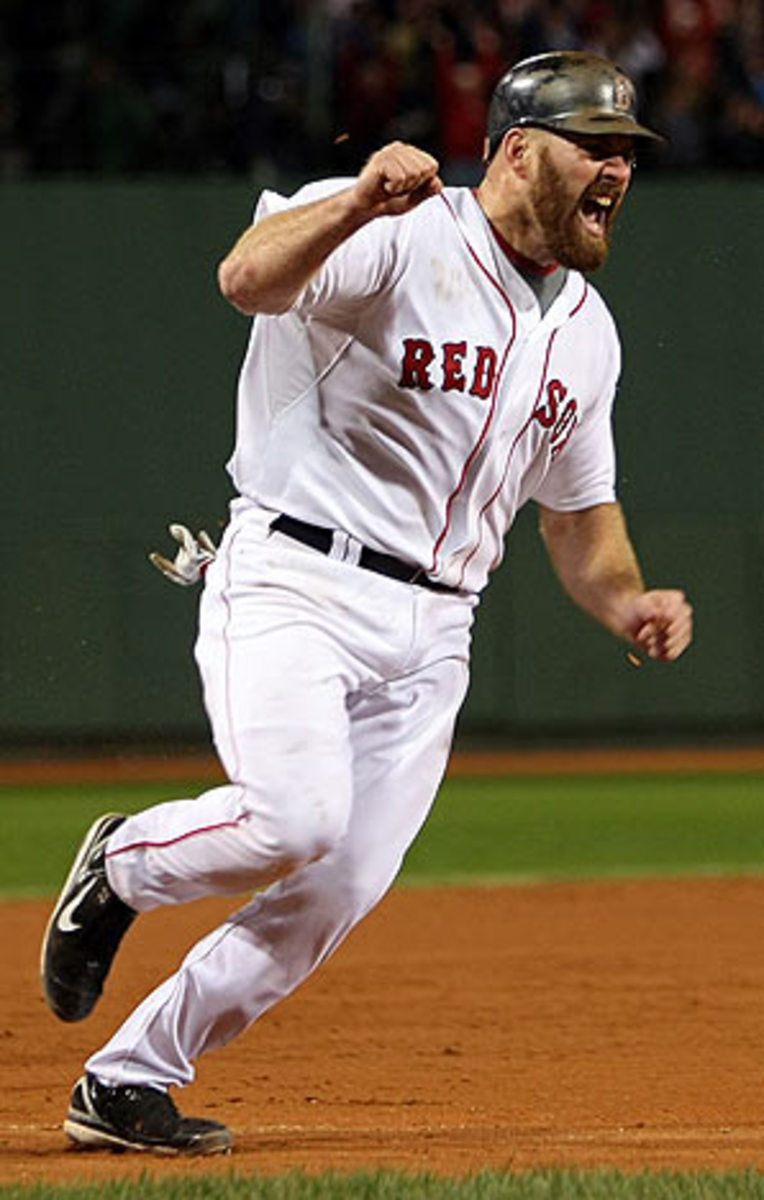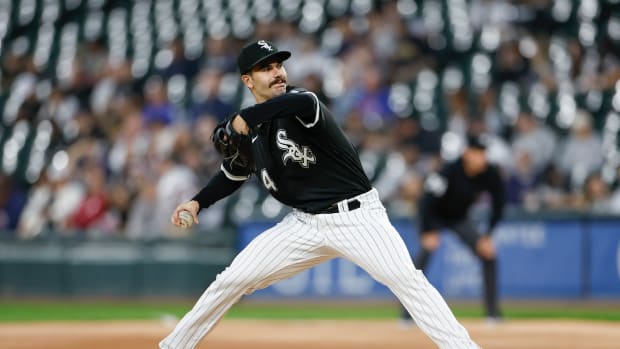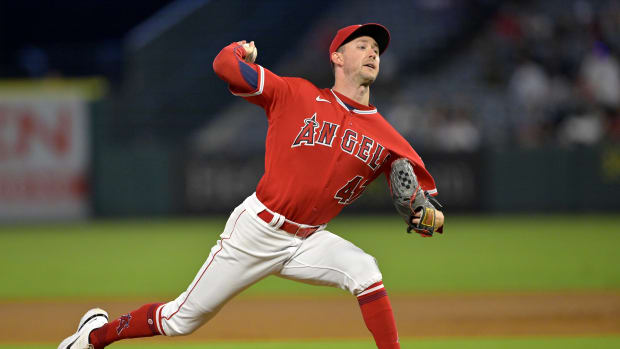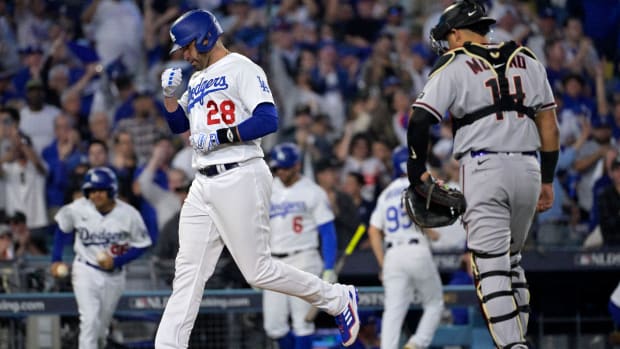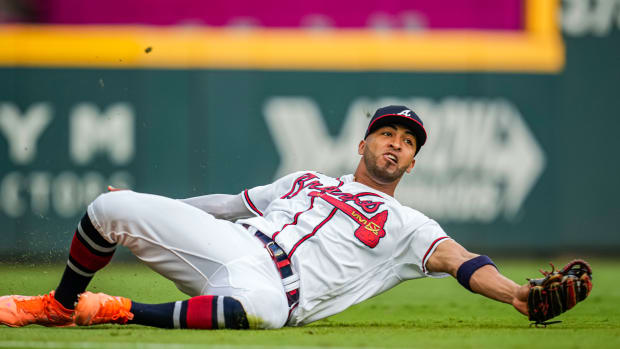The meaning of Game 5
With apologies to Elvis Costello (or whoever the line belongs to), writing about this game is like dancing about architecture.
You need more. You need sounds, and feelings, and touch, and all the things that make an experience burn itself into memory. Whatever I'm about to write here can't convey the look on my face when I realized that Gabe Gross had misjudged J.D. Drew's line drive, that the ball was going to land on the grass, that Kevin Youkilis was going to score. I can't write the shared glance of astonishment between my friend and I when Grant Balfour, and not Trever Miller, pitched to David Ortiz in the seventh. There are no words -- there will never be words -- to describe the mixed emotions of the Sox fans who watched the end of the game from their couches, the same ones who you could see walking out of the park after B.J. Upton's seventh-inning double.
No, today is one of those days where you bump up against the limits of your chosen medium, do the best that you can with the tools you have, and with a knowing nod concede that nothing is going to be good enough.
It's even more complicated than that, because a game like last night's challenges your belief system. Winning is about playing baseball better than the other guys do. The construct built up around the postseason, all of the soft words you always rail against -- character, heart, experience, clutch -- the ones that apply ex post facto and therefore are labels used to tell stories, not actual skills that affect outcomes... you know all these things are true, and you've spent your career trying to convince people to look past the storytelling.
Then a team down 7-0... no, down 29-5... with seven outs left in its season, showing all the life of the credit market, its fans crammed into subway cars and cursing their way out of parking lots, sullen, tired, stunned into submission. That team gets a single, and then another single, and then a hero, a damaged one, a human one, Superman in the second movie, powers dimmed, blood streaming from his nose, disrespected so much that his foe doesn't even reach for the good weapon... and that hero summons his strength, and strikes a blow, and a roar goes up that even the folks riding away from the park, below the ground, can hear, can feel.
In that moment, how do you say it's not just a little bit about who you are? How do you not think that this blow came from a place of sinew and fast-twitch and hand-eye, but also from some place you can't see on an MRI?
And as the game trickles on, and 7-4 became 7-6, and 7-7, and 8-7, how do you not assign some of those runs -- not all, not even most, but some, in a way you never have before -- to the people, rather than the players. Was the experience of 2004 and 2007 on one side, and the callowness of the players who lack that experience or any like it on the other, was that a factor in what we saw? Last night's game is an outlier, the extreme edge of the bell curve, a comeback almost unprecedented given the magnitude of the game. The facile storylines and trite labels that mark post-season coverage in the early 21st century are rightly regarded as meaningless, but when you're out beyond two deviations, and you're watching things that no one under 80 has ever seen, it is not only natural to question whether this could be the exception to your rules. It is mandatory.
And after the game, as you stare slack-jawed at the screen, reduced to monosyllabic expressions of awe and the occasional text message, you think about Saturday, and you wonder if there's going to be an effect. "Momentum is tomorrow's starting pitcher," you like to say, quoting a baseball genius. Maybe, though, tomorrow's starting pitcher is TBD, and momentum's taking a day to think about whether, maybe just this once, he wants to grab a bat and take some swings.
So maybe that's the legend of Game Five. It was the game that made a stathead consider chemistry.
***
You don't get from seven runs down to one run up without some big moments along the way, moments that were affected both by the players themselves and the decisions made by the men in the dugouts. Well, you don't get from 0-0 to 7-0 that way either, and what shouldn't be lost in the way the last quarter of the game developed is that the Rays continued to beat the daylights out of the Sox starters in the first quarter. Three homers in the game's first 13 batters gave the Rays a 5-0 lead, the third straight game in which the Rays led in the third inning by that score. The big three all got together this time: B.J. Upton in the first, Carlos Pena and Evan Longoria back-to-back in the third. If you tuned in late you might have been looking for the "Rain Delay" logo in a corner of the screen, convinced this was a replay of Game Four.
Tampa Bay's Scott Kazmir, famously starting in place of James Shields because of his career success at Fenway Park, was effective: six shutout innings, two singles and three walks allowed with seven strikeouts. It was his best outing in some time. He did throw 111 pitches through six innings, and with a rested bullpen behind him, six was all he needed to throw. With the bullpen getting warm, the Rays scored two more runs in the top of the seventh, and seemed set for a champagne celebration at Fenway.
In that seventh, Terry Francona made the first notable decision of the game, calling on Jonathan Papelbon with no one out and two men on, his team down 5-0. I can't say it was the wrong decision, although it had a tinge of desperation to it. Papelbon never pitches that early and never pitches down that far, and while I completely agree with the idea behind it -- Francona was using his best pitcher to keep the game as close as he could -- it's the kind of thing that would have made more sense with the game slightly closer or slightly further along. By using Papelbon to start the seventh, it was assured that he could not pitch the ninth, and most paths to a Sox victory were going to involve higher-leverage innings than what Papelbon was stepping into. Again, I don't know that it was the wrong move, because I understand the thought process, but it did surprise me.
Papelbon allowed a double steal and a wall-ball double to Upton to make the game 7-0, then pitched out of it thanks to a double play. He also threw the eighth, and he was on fumes doing so. The outing reminded me of Mariano Rivera's "blown save" in Game Five of the 2004 ALCS, where he'd been brought into a bases-loaded, no-out situation, pitched beautifully in getting three straight outs, and got dinged because one of the outs was a fly to medium-center field that scored a run. Papelbon pitched well, but as the Sox mounted their comeback, you couldn't help but wonder if the two runs that scored on his watch, if not his line, would haunt the Sox.
Joe Maddon would quickly shift the focus to the other dugout. He started the seventh with Balfour, who allowed a well-struck double to Jed Lowrie before whiffing the next two hitters. A Coco Crisp single to left advanced Lowrie but had no chance to score him. Dustin Pedroia went eight pitches deep before knocking a ball into right field that looked playable, but landed in front of Gross, who played it conservatively. I hated that decision; if you play it on a hop, the run scores, and you have first and second. If you dive and the ball gets by you, it costs a run and two bases on Pedroia. Up 3-0, 5-0, Gross makes the right decision. Up 7-0, I think you try and get the out. In any case, it was 7-1?the tying run was so far off that its parents were just beginning their courtship -- and David Ortiz was coming up.
If there's one decision I'd give back to Maddon, and there were a number to choose from, it would be this one. You need just seven outs, and this is as high-leverage a situation as you'd faced in the game. Using another pitcher to get through the seventh would have little cost, and keeping the game at 7-1 with the top of the lineup past would be pretty valuable. It should have been Trever Miller, lefty specialist, and I can't help but think that had this been the brand-name version of David Ortiz, he would have made the move. Ortiz's wrist problem, his poor performance to date, may have baited Maddon into keeping Balfour in. Two pitches later, the game was 7-4, and for the first time since the third inning of Game Three, the Red Sox had some life.
If Ortiz's home run had a tinge of clutch to it -- you wonder what the reaction would be if Alex Rodriguez had broken a post-season slump by hitting a three-run homer while down six -- that fit his persona, the eighth-inning blast by J.D. Drew played against type. The laconic Drew, one of the more under-appreciated players of his era, had a number of big hits for the Sox last October, and the moment his two-run blast went into the right-field grandstand was when a Sox win began to feel inevitable. It's a trick of sports, you know, when the team holding the lead feels like it's trailing. Drew's homer might as well have been a grand slam for the effect it had on the game.
Dan Wheeler bounced back to get Lowrie and Sean Casey, taking some air out of the proceedings and, as Balfour had done moments ago, making it appear as if the Rays were back in control. Mark Kotsay, batting ninth because there is no tenth, roped a double to left-center that set the crowd off again. Crisp, who appears to be taking back the job he lost a year ago at this same time, had the at-bat of the year, going 10 pitches deep -- perhaps balls four, five, and six along the way -- to line a single to right field. Gross once again failed to make a play, one-hopping the infield with a throw that left a divot. The Rays threw out Crisp advancing to second, but absolutely no one cared.
The Sox were tied, it was the top of the ninth, and Papelbon was done. Having thrown 38 pitches, there was no way to leave him in. Francona turned to the last of his quartet of good relievers, Justin Masterson, who did the one thing he couldn't do in this situation: allow a single to Jason Bartlett. The sidearming Masterson now had to face Akinori Iwamura with a man on, deal with the runner on first, and likely bring Pena to the plate. The decision to use Papelbon in the seventh loomed large over this moment, as Masterson pitched carefully to Upton, eventually walked him, and set up what seemed to be the reversal of fortune, a Pena/Masterson matchup that had runs written all over it.
I'm not sure what the future will bring for Justin Masterson. He's probably going to make a lot of money in this game, be on the field for great moments, compete for championships, play with Hall of Famers. Any review of his career, though, no matter what happens, is going to feature a 1-0 pitch, on a cool October night, and his teammates turning a ground ball into two outs and a chance to complete history.
The air of inevitability returned, and persisted even as J.P. Howell dispatched Pedroia and Ortiz. Even a stellar play by Bartlett on Pedroia, staying with a ground ball deflected by Longoria to get the out, did little to change the sense that it was just a matter of time. With two outs, Youkilis chopped a ball weakly to third base, and Longoria, whose defense at third base is a huge asset for the Rays, didn't square up his body to first base after backhanding the ball. The weak throw, unnecessary under the circumstances, bounced up above Pena's glove and past him into the stands, allowing Youkilis to reach second base. It was 80 percent of a great play, but the missing 20 percent was worth two bases.
After an intentional walk to Jason Bay -- inexplicably deemed "unconventional thinking" on the broadcast -- Drew came up again. Howell fell behind 3-0, earning a visit from Maddon along the way, then threw a changeup for a strike. Perhaps feeling it was the one pitch he could throw for a strike, he went back to it on 3-1, and Drew pulled a line drive over Gross' head to win the game.
Just behind "where was Trever Miller?" is this question: Where was Fernando Perez? Maddon doesn't typically take Gross out for defense, but three critical plays in the game all happened in right field, and Gross didn't make any of them. Would Perez have dove for Pedroia's single, made a strong throw on Kotsay, gotten back faster to snag Drew's line drive? I'm not sure. I know he has more speed than Gross does, which certainly couldn't have hurt his chances. Set aside the seventh-inning play; Gross' awful throw in the eighth allowed the tying run to score on a play that should have been close, and his terrible jump on Drew's single let the winning run in. You can't tell the story of this game without judging his defense.
Grant Balfour and Evan Longoria and Gabe Gross and Joe Maddon all came up short. David Ortiz and Coco Crisp and J.D. Drew didn't. The combination made history, and if the circumstances of Game Five let you wonder about the value of experience, Game Six will test the notion of momentum. You have to go a long way to find a baseball team taking the field with a worse recent memory than the Rays have.






























